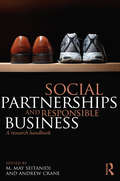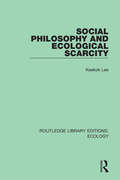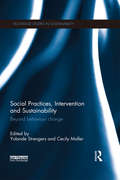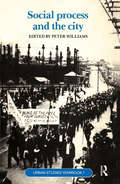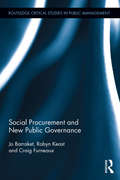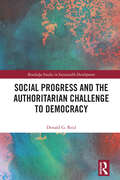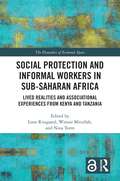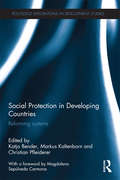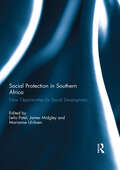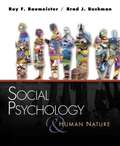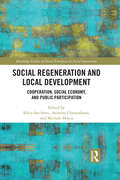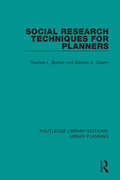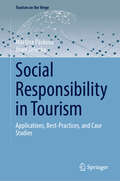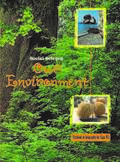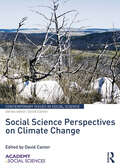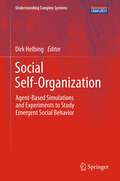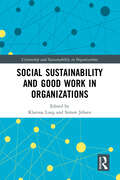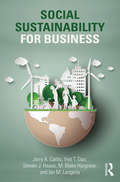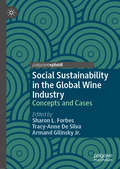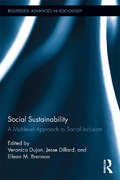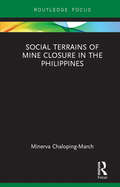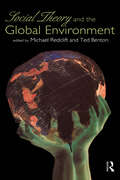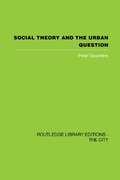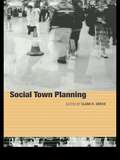- Table View
- List View
Social Partnerships and Responsible Business: A Research Handbook
by M. May Seitanidi Andrew CraneCross-sector partnerships are widely hailed as a critical means for addressing a wide array of social challenges such as climate change, poverty, education, corruption, and health. Amid all the positive rhetoric of cross-sector partnerships though, critical voices point to the limited success of various initiatives in delivering genuine social change and in providing for real citizen participation. This collection critically examines the motivations for, processes within, and expected and actual outcomes of cross-sector partnerships. In opening up new theoretical, methodological, and practical perspectives on cross-sector social interactions, this book reimagines partnerships in order to explore the potential to contribute to the social good. A multi-disciplinary perspective on partnerships adds serious value to the debate in a range of fields including management, politics, public management, sociology, development studies, and international relations. Contributors to the volume reflect many of these diverse perspectives, enabling the book to provide an account of partnerships that is theoretically rich and methodologically varied. With critical contributions from leading academics such as Barbara Gray, Ans Kolk, John Selsky, and Sandra Waddock, this book is a comprehensive resource which will increase understanding of this vital issue.
Social Philosophy and Ecological Scarcity (Routledge Library Editions: Ecology #8)
by Keekok LeeOriginally published in 1989 Social Philosophy and Ecological Scarcity presents a systematic study of the implications of ecological scarcity for social philosophy. The book argues for a new social philosophy based on a conception of the ‘good society’ and the ‘good life’ which makes fewer, rather than more demands on scarce ecological resources. The book shows that the two major competing social philosophies in modern philosophical thought – the bourgeois liberal and the state socialist – are both forms of capitalism. Despite their obvious differences, they both pursue the logic of capitalism, of ever-increasing accumulation, growth and consumption. This pursuit is carried out by means of modern science and its technology, which assume that Nature’s resources are inexhaustible and can be exploited to meet infinite human wants or needs, ignoring ecological scarcity. The recognition of ecological scarcity would lead to a social philosophy, based on a frugal mode of socialism which has more affinities with the social visions of Fourier and Morris than with that of Marx. Their theories, far from being too ‘utopian’, are shown as more ‘realistic’ and less ‘fantastic’ than either bourgeois capitalism or state capitalism based on the Marxist model.
Social Practices, Intervention and Sustainability: Beyond behaviour change (Routledge Studies in Sustainability)
by Yolande Strengers Cecily MallerIn an era of dramatic environmental change, social change is desperately needed to curb burgeoning consumption. Many calls to action have focused on individual behaviour or technological innovation, with relative silence from the social sciences on other modes and methods of intervening in social life. This book shows how we can go beyond behaviour change in the pursuit of sustainability. Inspired by the ‘practice turn’ in consumption studies, this interdisciplinary book looks through the lens of social practice theory to explore important and timely questions about how to intervene in social life. It discusses a range of applied sustainability topics including energy consumption, housing provision, water demand, transport, climate change, curbside recycling and smart grids, seeking to redefine what intervention is, how it happens, and who or what can intervene to address the growing list of environmental calamities facing contemporary societies. These issues are explored through a range of specific case studies from Australia, the UK and the US, providing theoretical insights that are of international relevance. The book will be of interest to researchers and students in the fields of sociology, consumption studies, environmental studies, geography, and science and technology studies, as well as policy makers and practitioners seeking to intervene in social life for sustainability.
Social Process and the City: Urban Studies Yearbook, 1 (Urban Studies Yearbook #Vol. 1)
by Peter WilliamsContemporary urban studies engages a wide range of approaches in the analysis of the processes at work in urban areas. These approaches derive from anthropology, economics, geography, history, politics and sociology as well as from the professional experience of town planning and architecture. Social process and the city reflects this growing cross-disciplinary engagement. This shows the important, problematic, role which cities in particular, and urban change in general have played in the growth of Australia. The overriding concern of each essay in this collection is to develop an understanding of the ways urban areas function and an awareness of how differing interpretations of 'urban phenomena' might be applied. This attention to the nature of the forces at work, and the processes these forces manifest themselves in, is extended both empirically and conceptually. This book was first published in 1983.
Social Procurement and New Public Governance (Routledge Critical Studies in Public Management)
by Josephine Barraket Robyn Keast Craig FurneauxIn recent years, the search for innovative, locally relevant and engaging public service has become the new philosophers’ stone. Social procurement represents one approach to maximising public spending and social value through the purchase of goods and services. It has gained increasing attention in recent years as a way that governments and corporations can amplify the benefits of their purchasing power, and as a mechanism by which markets for social enterprise and other third sector organisations can be grown. Despite growing policy and practitioner interest in social procurement, there has been relatively little conceptual or empirical thinking published on the issue. Taking a critically informed approach, this innovative text examines emerging approaches to social procurement within the context of New Public Governance (NPG), and examines the practices of social procurement across Europe, North America, and Australia. Considering both the possibilities and limitations of social procurement, and the types of value it can generate, it also provides empirically-driven insights into the practicalities of ‘triple bottom line’ procurement, the related challenges of measuring social value and the management of both the strategic and operational dimensions of procurement processes. As such it will be invaluable reading for all those interested in social services, public governance and social enterprise.
Social Progress and the Authoritarian Challenge to Democracy (Routledge Studies in Sustainable Development)
by Donald G. ReidSocial Progress and the Authoritarian Challenge to Democracy examines the authoritarian challenge to present-day democracy through a framing of social progress theory and the idea of the social contract. Building on the author’s previous work, this book discusses whether social progress is linear and on a continual upward trajectory to human betterment, or if there are peaks and troughs along the way. More importantly, it questions that, if social progress exists, is it compatible with social and environmental sustainability? At the outset the book introduces the concepts of social contract theory and the idea of human social progress, long considered to be settled conditions, now ripe for further examination. Each chapter carefully analyses the contemporary struggle between democracy and authoritarianism, using examples from the USA as a foundation to discuss and compare democracies from around the world encountering the pressures of rising authoritarianism, including anti-immigration, xenophobia and anti-institutionalism. It argues that if the climate crisis is to be urgently addressed as required, the rise in authoritarian thinking, with its focus on maintaining power and the creation of individual wealth, presents a challenge to both our societal foundations and environmental sustainability. Highlighting and analysing topics of critical importance to today’s society, this book will have widespread appeal to academics, researchers and postgraduate students throughout the social sciences including sociology, political science, philosophy, environmental sustainability and development studies.
Social Protection and Informal Workers in Sub-Saharan Africa: Lived Realities and Associational Experiences from Tanzania and Kenya (The Dynamics of Economic Space)
by Lone RiisgaardThe promotion of social protection in Sub-Saharan Africa happens in a context where informal labour markets constitute the norm, and where most workers live uncertain livelihoods with very limited access to official social protection. The dominant social protection agenda and the associated literature come with an almost exclusive focus on donor and state programmes even if their coverage is limited to small parts of the populations – and in no way stands measure to the needs. In these circumstances, people depend on other means of protection and cushioning against risks and vulnerabilities including different forms of collective self-organizing providing alternative forms of social protection. These informal, bottom-up forms of social protection are at a nascent stage of social protection discussions and little is known about the extent or models of these informal mechanisms. This book seeks to fill this gap by focusing on three important sectors of informal work, namely: transport, construction, and micro-trade in Kenya and Tanzania. It explores how the global social protection agenda interacts with informal contexts and how it fits with the actual realities of the informal workers. Consequently, the authors examine and compare the social protection models conceptualized and implemented ‘from above’ by the public authorities in Tanzania and Kenya with social protection mechanisms ‘from below’ by the informal workers own collective associations. The book will be of interest to academics in International Development Studies, Political Economy, and African Studies, as well as development practitioners and policy communities.
Social Protection in Developing Countries: Reforming Systems (Routledge Explorations in Development Studies)
by Markus Kaltenborn Katja Bender Christian PfleidererProviding universal access to social protection and health systems for all members of society, including the poor and vulnerable, is increasingly considered crucial to international development debates. This is the first book to explore from an interdisciplinary and global perspective the reforms of social protection systems introduced in recent years by many governments of low and middle-income countries. Although a growing body of literature has been concerned with the design and impact of social protection, less attention has been directed towards analyzing and explaining these reform processes themselves. Through case studies of African, Asian, and Latin American countries, this book examines the ‘global phenomenon’ of recent social protection reforms in low and middle-income areas, and how it differs across countries both in terms of scope and speed of institutional change. Exploring the major domestic and international factors affecting the political feasibility of social protection reform, the book outlines the successes and failures of recent reform initiatives. This invaluable book combines contributions from both academics and practitioner experts to give students, researchers and practitioners in the fields of social security, economics, law and political science an in-depth understanding of political reform processes in developing countries.
Social Protection in Southern Africa: New Opportunities for Social Development
by Leila Patel, James Midgley and Marianne UlriksenA new generation of innovative social protection strategies is emerging in southern Africa. Although cash transfers are most prevalent, some country strategies include combinations of interventions such as food, livelihood inputs and support, asset building, public works and social services. The strategies vary in their commitment to social rights, their institutional and funding arrangements, the reach, scope and design of the programmes, and the behavioural conditions attached to grant access. The proliferation of national social protection in the Global South has been widely supported by governments, international agencies and non-governmental organisations (NGOs).This book offers researchers and policymakers much to think about when considering the rapid growth of social protection in southern Africa, the challenges this presents and the opportunities it offers for social development and economic growth. Hence, the book is a contribution to scholarship and policy debate on how to solve intractable social development problems in Africa and elsewhere.This book was originally published as a special issue of Development Southern Africa.
Social Psychology and Human Nature
by Roy F. Baumeister Brad J. BushmanThe material discussed in this book is intensely relevant to your life. For example, how many of you have asked yourself something along these lines: How can I get him to go along with my plan? Should I ask her right up front to do this big favor, or is there a better way to get her to say yes? How can I bring them around to my way of thinking? Chances are, something in this book will prove helpful to you in the future. This is not to say that social psychology is a cookbook for how to manipulate people. But social psychology can help you understand basic principles of social influence, as well as many other principles of social behavior.
Social Regeneration and Local Development: Cooperation, Social Economy and Public Participation (Routledge Studies in Social Enterprise & Social Innovation)
by Asimina Christoforou Silvia Sacchetti Michele MoscaSocial regeneration is about the transformative processes that, through institutional choices that embody cooperation and inclusion, develop opportunities and capabilities for weak categories, and transversally for society. The challenge of social regeneration can be addressed, in part, through organisational solutions increasingly identified with social economy organisations, since they are characterised by a social objective, cooperation and inclusive democratic governance. Besides the organisational element, Social Regeneration and Local Development provides a new perspective on interacting socio-economic factors, which can work in synergy with the social economy organisations model to promote and sustain social regeneration and well-being. Such elements include civic engagement and social capital, the nature of the welfare system, the use of physical assets in urban and rural areas, leadership, technology, and finance. By analysing organisational and contextual elements, this book offers an institutional perspective on how socio-economic systems can reply to challenges such as social and environmental degradation, financial crises, immigration, inequality, and marginalisation.
Social Research Techniques for Planners (Routledge Library Editions: Urban Planning #5)
by Gordon E. Cherry Thomas L. BurtonOriginally published in 1970 Social Planning Techniques for Town Planners introduces social research methods for town planners. The book places an emphasis on social research within the planning process, and addresses the problem faced by the research worker at successive stages of a research project. It outlines the major conceptual and organizational problems likely to be encountered in any social research for planning, and provides guidelines for tackling these. The book’s focus is on social science research methods and the application of social and economic research to issues of urban and regional planning and administration.
Social Responsibility in Tourism: Applications, Best-Practices, and Case Studies (Tourism on the Verge)
by Martina Pásková Josef ZelenkaThis monograph offers a comprehensive examination of responsible tourism, meticulously deconstructing the core tenets of socio-cultural, environmental, and economic accountability within the framework of sustainable tourism. The work underscores the intrinsic significance of local attributes, emphasizing their pivotal role in shaping responsible practices. Guiding through the intricate terrain of challenges and opportunities inherent in integrating responsible paradigms within the dynamic tourism sector, the authors introduce a prescriptive implementation framework. This framework steers tourism stakeholders towards equilibrium, enabling present actions to safeguard and augment conditions for sustainable future development. Rooted in scholarly depth, augmented by synoptic diagrams and references to supplementary resources, the book converges into an analysis of concrete instances—illustrative case studies, products, and applications—demonstrating the embodiment of social responsibility in tourism's fabric. By spotlighting both successful and adverse examples, the monograph underscores the vital interplay of environmental, economic, and socio-cultural dimensions, encapsulating the essence of responsible tourism's enduring impact.
Social Science - Our Environment class 7 - NCERT - 23
by National Council of Educational Research and TrainingThe Class VII Social Science textbook, "Our Environment" by NCERT in Geography, provides a comprehensive exploration of various environmental aspects. It delves into fundamental geographical concepts, examining the Earth's surface, climate, natural resources, and their impact on human life. The book elucidates the significance of environmental conservation and sustainable development, fostering an understanding of the intricate relationship between humans and their surroundings. Through engaging content and interactive exercises, it encourages critical thinking about environmental challenges and solutions. The textbook aims to instill in students a sense of responsibility towards the environment while imparting essential geographical knowledge to facilitate a holistic understanding of the world around them.
Social Science Contemporary India-II class 10 - NCERT - 23 (Geography)
by National Council of Educational Research and TrainingSocial Science Contemporary India-II is an NCERT textbook designed for Class 10 students, offering an in-depth exploration of various aspects of contemporary India. Divided into different chapters, the book covers a wide array of topics crucial to understanding India's social, economic, political, and cultural landscape. It delves into themes such as resources and development, agriculture, industries, globalization, and sectors like tourism and IT. Additionally, it sheds light on challenges faced by India concerning sustainable development, gender, and democracy. The book emphasizes the significance of inclusive growth, environmental conservation, and the role of technology in shaping India's future. Through case studies, maps, illustrations, and engaging narratives, it provides comprehensive insights into the diverse facets of India's society and economy, encouraging critical thinking and a deeper understanding of the nation's complexities. It aims to equip students with the knowledge and analytical skills necessary to comprehend contemporary India's dynamics and encourages them to become responsible and informed citizens.
Social Science Perspectives on Climate Change (Contemporary Issues in Social Science)
by David CanterAlthough it is generally accepted that the climate is changing for the worse and that human activities are a major contributing factor in that change, there is still only marginal response to the challenge posed by climate change. The reasons behind this limited response are becoming clearer through the recognition that climate change is not just a set of physical science facts, but it is also part of a series of complex social processes. Consequently, this book is important in providing social science perspectives on a range of attempts to adjust human activity to reduce its environmental impact. These attempts vary from the changing of the dress code in Japanese offices to the creation of zero-carbon, gated communities in Bangalore, India. Taken together, the contributions to this book provide timely insights into the complexities of saving the planet through human endeavour. This book was originally published as a special issue of Contemporary Social Science.
Social Self-Organization
by Dirk HelbingWhat are the principles that keep our society together? This question is even more difficult to answer than the long-standing question, what are the forces that keep our world together. However, the social challenges of humanity in the 21st century ranging from the financial crises to the impacts of globalization, require us to make fast progress in our understanding of how society works, and how our future can be managed in a resilient and sustainable way. This book can present only a few very first steps towards this ambitious goal. However, based on simple models of social interactions, one can already gain some surprising insights into the social, ``macro-level'' outcomes and dynamics that is implied by individual, ``micro-level'' interactions. Depending on the nature of these interactions, they may imply the spontaneous formation of social conventions or the birth of social cooperation, but also their sudden breakdown. This can end in deadly crowd disasters or tragedies of the commons (such as financial crises or environmental destruction). Furthermore, we demonstrate that classical modeling approaches (such as representative agent models) do not provide a sufficient understanding of the self-organization in social systems resulting from individual interactions. The consideration of randomness, spatial or network interdependencies, and nonlinear feedback effects turns out to be crucial to get fundamental insights into how social patterns and dynamics emerge. Given the explanation of sometimes counter-intuitive phenomena resulting from these features and their combination, our evolutionary modeling approach appears to be powerful and insightful. The chapters of this book range from a discussion of the modeling strategy for socio-economic systems over experimental issues up the right way of doing agent-based modeling. We furthermore discuss applications ranging from pedestrian and crowd dynamics over opinion formation, coordination, and cooperation up to conflict, and also address the response to information, issues of systemic risks in society and economics, and new approaches to manage complexity in socio-economic systems. Selected parts of this book had been previously published in peer reviewed journals.
Social Sustainability and Good Work in Organizations (Citizenship and Sustainability in Organizations)
by Klarissa Lueg Simon JebsenThis edited research monograph collects nine unique research contributions on the concept of social sustainability and its connection to possibilities and hindrances for good work in organisations. Social sustainability, in organisational contexts, emphasizes the long-term well-being of stakeholders and communities. The authors in this book demonstrate how organisational long-term strategies should prioritise employee well-being, mental health, community engagement, and ethical supply chain management, inter alia. Readers, from undergraduate students to the research community, will learn how long-term social sustainability orientation is different from Corporate Social Responsibility, which responds to immediate stakeholder expectations. The United Nations' Sustainable Development Goals have nudged many organisations to implement social sustainability, and many authors in this book relate to UN concepts such as the SDGs or Global Compact’s definition of social sustainability. However, many organisations have come under scrutiny for acting merely ceremonial to live up to the current megatrends. In consequence, readers will take away that the line between genuine corporate mission and ceremonial lip services must be critically observed, and how this can be done in different areas. Key chapters of this book explore social sustainability, e.g., in higher education (as sustainable knowledge in business students), in corporate communication (employee identification, corporate volunteering, and corporate heritage), and in sustainable human resource management practices. Workplace toxicity, especially towards minorities, is explored, highlighting both the role of bystanders, and the financial repercussions of ignoring workplace harassment. Digital transformation's social implications, employee well-being, and the importance of psychological safety in startups are addressed. The chapters, all together, signify the relevance of meaningful work for long-term societal cohesion and individual fulfilment.
Social Sustainability for Business
by Jerry A. Carbo Viet T. Dao Steven J. Haase M. Blake Hargrove Ian M. LangellaSocial Sustainability for Business demonstrates the need for a transformational change to the way businesses across the globe operate. What has become the standard, accepted "business model," with a focus on corporate profit, shareholder wealth maximization, and GDP growth, is no longer a sustainable business model for workers, consumers, communities, society, the planet, or any of its inhabitants and ecosystems. The authors argue that the current commercial system depletes natural resources, denigrates human rights, and inhibits positive social and technological innovation. To address these issues, they focus on societal goals—such as a sustainable planet, meeting human rights of workers, and safe products for consumers—and outline steps that organizations and individuals must take to achieve them. Readers will gain insight into the psychological barriers to and influences on sustainable behavior. They will also learn how reconsidering corporate social responsibility and business ethics can stop and reverse the destruction of a profit-based approach. Cases on modern examples of sustainability or lack thereof explain how establishing and maintaining a socially sustainable business system can protect the environment, meet the rights of its people, and ensure that their needs are met tomorrow. End-of-chapter and end-of-case discussion questions will help students in sustainability classes to think critically about the practical impact of the topics discussed.
Social Sustainability in the Global Wine Industry: Concepts and Cases
by Armand Gilinsky Jr. Sharon L. Forbes Tracy-Anne De SilvaThis book examines the social dimension of sustainability in the wine industry. Social sustainability focuses on people and communities. Contributors explore topics such as philanthropy, poverty, natural disasters, communication, and wine tourism from a global perspective using research and case studies in developed and developing countries. This edited book provides researchers, academics, practitioners and students with varied perspectives of social sustainability in the global wine industry.
Social Sustainability: A Multilevel Approach to Social Inclusion (Routledge Advances in Sociology #101)
by Veronica Dujon Jesse Dillard Eileen M. BrennanHow can we raise the standard of living of the world’s poor and maintain high levels of social health and well-being in the developed world, while simultaneously reducing the environmental damage wrought by human activity? The social dimension of sustainability is becoming recognized as a necessary if not sufficient condition for attaining economic and environmental sustainability. The requisite dialogue requires inclusion at multi-levels. This collection of works is an ambitious and multi-disciplinary effort to indemnify and articulate the design, implementation and implications of inclusion. Included are theoretical and empirical pieces that examine the related issues at the local, national and international levels. Contributors are grounded in Sociology, Economics, Business Administration, Public Administration, Public Health, Psychology, Anthropology, Social Work, Education, and Natural Resource Management.
Social Terrains of Mine Closure in the Philippines (Routledge Studies of the Extractive Industries and Sustainable Development)
by Minerva Chaloping MarchThe current discourse on mine closure is informed predominantly by industry and corporate perspectives and predicated by experiences of mainly mining companies that are based in developed countries where necessary planning frameworks and regulatory requirements are well-established. Mine closure planning, well promoted and accepted as good business practice in the global minerals industry, has been primarily technical and precautionary both in approach and focus. Planning, modelling and monitoring strategies incorporate comprehensive and detailed elements such as properties inherent in landforms, climate, geology, flora and fauna, among others. However, locality-based concerns that revolve around resource access and tenure, rights and entitlements tied to locality and indigeneity, labour recruitment, and other non-bio-physical elements are hardly examined. Any mine closure program that omits these elements is deficient and therefore ineffective. Social Terrains of Mine Closure in the Philippines, based on ethnographic research and archival materials, presents the varying experiences of three mines to demonstrate that the mine closure process is an intense locus for competition and compromises among various social actors. This book offers key messages for understanding the complex socio-cultural, economic, political, and business realities that make up the social terrains of mine closure, and will be of great interest to students and researchers in development studies, community development, business studies, anthropology, and sociology. It will also appeal to those working in the global minerals sectors and NGOs that engage in development work and advocacy for responsible mining.
Social Theory and the Global Environment (Global Environmental Change Ser.)
by Ted Benton Michael RedcliftThis book marks a watershed in the social sciences. The qualitative, critical perspective of sociology and allied disciplines challenges the technocentric `managerialism' which dominates environmental policy, its discourse and its impact. The authors explore the relationship between social theory and sustainability in an attempt to transend technical rhetoric and embrace a broader understanding of `nature'.
Social Theory and the Urban Question
by Peter SaundersSocial Theory and the Urban Question offers a guide to, and a critical evaluation of key themes in contemporary urban social theory, as well as a re-examination of more traditional approaches in the light of recent developments and criticism. Dr Saunders discusses current theoretical positions in the context of the work of Marx, Weber and Durkheim. He suggests that later writers have often misunderstood or ignored the arguments of these 'founding fathers' of the urban question. Dr Saunders uses his final chapter to apply the lessons learned from a review of their work in order to develop a new framework for urban social and political analysis. This book was first published in 1981.
Social Town Planning
by Clara H. GreedMany issues such as access for the disabled, childcare facilities, environmental matters, and ethnic minority issues are excluded from town planning considerations by planning authorities. This book introduces the concept of `social town planning' to integrate planning policy and practices with the cultural and social issues of the people they are planning for. Part 1 provides background on the development of a social dimension to the predominantly physical, land use based, British town planning system. Part 2 investigates a representative selection of minority planning topics, in respect of gender, race, age and disability, cross-linked to the implications for mainstream policy areas such as housing, rural planning and transport. Part 3 discusses the likely influence of a range of global and European policy initiatives and organisations in changing the agenda of British town planning. Planning for healthy cities, sustainability, social cohesion, and equity are discussed. Part 4 looks at `the problem' from a cultural perspective, arguing that a great weakness in the British system, resulting in ugly and impractical urban design, has been the lack of concern among planners with social activities and cultural diversity. Alternative, more culturally inclusive approaches to planning are presented which might transcend the social/spatial dichotomy, such as urban time planning. Concluding that the process of planning must change, the authors ague that the culture and composition of the planning profession must particularly change to be more representative and reflective of the people they are `planning for', in terms of gender, race and minority composition.
